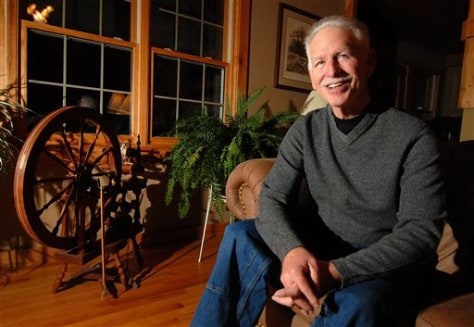Corruption, graft entrenched in Illinois politics
Blagojevich case is just the latest in a long list of scoundrels and scandals
Below:

AP
Former Judge Brocton Lockwood gives his thoughts on corruption in Illinois' government, at his home in Harrisburg, Ill., on Friday, Dec. 12. More than 25 years ago, Lockwood, then a visiting small-town judge, stashed a tape recorder in his cowboy boot and came away with shocking evidence of bribe-taking and bagmen in Chicago's courts.

updated 12/14/2008 4:06:47 AM ET
Print
Font:
CHICAGO — More than 25 years ago, a visiting small-town judge stashed a tape recorder in his cowboy boot and came away with shocking evidence of bribe-taking and bagmen in Chicago's courts.
Former Judge Brocton Lockwood was part of an unprecedented FBI sting operation in the Cook County courts called "Operation Greylord" that uncovered judges, lawyers and clerks taking cash, fixing cases and engaging in other brazen judicial corruption.
The case is a stark example of the corruption that has become a cottage industry in Illinois and contributed to its long history of scoundrels and scandals. Last week, there was an addition to the list: Gov. Rod Blagojevich's arrest on charges that he schemed to auction off President-elect Barack Obama's open Senate seat.
So when the governor was escorted by federal agents from his home in handcuffs, it seemed painfully familiar to Lockwood.
"I thought nothing has changed," the retired judge said. "I'm embarrassed for the state. I'm disappointed for the nation because this is going to divert attention from Obama's efforts to deal with bigger issues than Blagojevich. ... It just makes politics a sleazy business."
Lockwood's puzzlement was echoed by people around the nation as the Blagojevich scandal unfolded: What is it about Illinois that seems to breed political corruption, and why hasn't anyone been able to do anything about it?
Corruption and graft have become so entrenched over the decades that they've become part of the political culture, and experts cite a list of reasons why: Weak state campaign finance laws that have allowed influence peddlers to make big contributions. Lawmakers who don't always get close scrutiny. A patronage system that makes employees beholden to political bosses. And a jaded public that seems to accept chicanery as the cost of doing business.
Advertise |
AdChoices
"The rest of the country kind of grew up and got past the corrupt legislators and urban Machines," said Kent Redfield, a University of Illinois-Springfield political science professor. "The reform-good government movement never got traction in Illinois."
"In some ways, Illinois kind of reminds you of Third World countries where everyone knows to get things done you have to bribe someone every step of the way," he added.
History of rogues and crooks
The state's history of rogues and crooks ranges from a long-ago secretary of state who died leaving hundreds of thousands of dollars mysteriously stashed in shoeboxes in his hotel closet to a judge who took money to fix murder cases. Former governors, congressmen, aldermen, and state and city workers have all gone to prison.
"If it isn't the most corrupt state in the United States, it's certainly one hell of a competitor," Chicago FBI chief Robert D. Grant said when the charges were announced against Blagojevich.
Other political news of note

Reuters
Obama’s tough balancing act to fix ‘stuck’ politics
First Read: At Democratic fundraisers the president decries ‘stuck’ politics but acknowledges the tricky balance between trying to elect Democrats and work with Republicans.
McCain: US weapons would 'help' in Syria war
For Bachmann, probes and politics didn't line up
As Congress debates curbs on tax breaks, a new one debuts in 2014
Bachmann latest casualty of presidential curse
The top competitors seem to be New Jersey and Louisiana. More than 130 public officials in New Jersey have been found guilty of federal corruption in the past seven years. And Louisiana more than holds its own. A congressman once described the state this way: "Half of Louisiana is under water, and the other half is under indictment."
Louisiana also is known from its flamboyant governors, from Huey Long to Edwin Edwards, who is now sitting in prison for his involvement in a scheme to rig riverboat casino licensing.
But no state is immune.
Nationwide, more than 1,800 federal, state and local officials have been convicted of public corruption in the last two years, according to FBI statistics released this spring. The number of pending cases has jumped by 51 percent since 2003, the agency said. In the last decade or so, the governors of Louisiana, Connecticut and Rhode Island have pleaded guilty or been convicted of wrongdoing.
But in Illinois, especially in Chicago, graft has been so rampant it's become part of the folklore.
In "Boss," the unauthorized biography of the late Mayor Richard J. Daley, Pulitzer-Prize winning columnist Mike Royko suggested the city change its official motto, "Urbs in Horto" or "City in a Garden" to "Ubi Est Mea?" or "Where's Mine?"
That was more than 35 years ago, but the problem still persists.
"It seems to me that corruption in Illinois is incorrigible," said Ron Safer, former head of the criminal division at the U.S. attorney's office and now in private practice. "Why does someone who has achieved the public acclaim and success that results in them attaining public office risk losing everything for money? It is impossible for me to understand."
Advertise |
AdChoices
Jay Stewart, head of the Better Government Association, believes efforts to downplay corruption are wrongheaded.
"I don't look at convictions in our state and argue there are just a few bad apples," he said. "The public believes there's a problem and it's a systemic problem. But they feel powerless and unable to change it. ... I think people view it as blood sport ... and they throw up their hands and say it's just entertainment."
There have been reforms in the state, most notably a new ethics law designed to limit the impact of money in politics. It was approved only after Obama, a former state senator, called his one-time mentor, Senate President Emil Jones, and urged its passage.
Blagojevich vetoed it, and the Senate overrode him. But in a strange twist, prosecutors say that the law may have been Blagojevich's undoing, alleging that he carried out many of his misdeeds to beat its Jan. 1 implementation.
Illinois has long been known as the "Wild West" of campaign finance, with virtually no limits on who can contribute and how much. The new law prohibits people with state contracts of $50,000 or more from contributing to the politicians who administer them, or to their opponents in an election year.
But Redfield, the political science professor, acknowledges the measure is a narrow prohibition and reflects how hard it is to make sweeping reforms.


 Comments (
Comments (
 Printable Version
Printable Version Email
This
Email
This Font
Font





